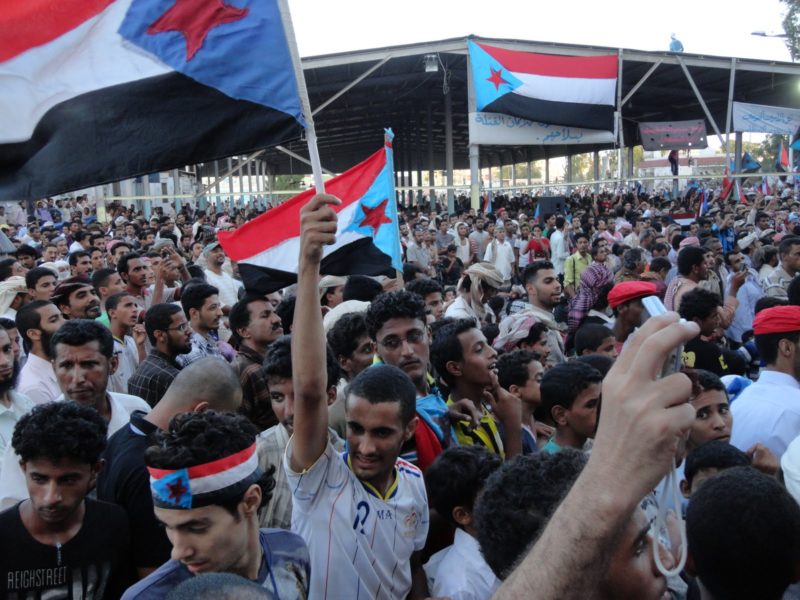By guest contributor Tyler B. Parker
Separatist struggles often shape international politics. Some secessionist movements have yielded sovereign states: South Sudan through ballots, East Timor with bargains, and Eritrea via bullets. Many separatists achieve national recognition just short of statehood, such as in Quebec, Catalonia, and Scotland. Others mirror the kinds of proto-states seen in Kurdistan or Somaliland: administrative units that possess high capacity and legitimacy in portions of the sovereign states in which they are embedded.
One such proto-state is the Southern Transitional Council (STC), an Emirati-backed group vying for an independent South Yemen. Since its formation in May 2017, the STC has challenged the authority of Yemen’s President Abdu Rabbu Mansour Hadi. And unlike the frozen conflicts in northern Iraq and Somalia, the fight in southern Yemen is heating up. In April, the STC declared “self-administration” for the South. By late June, STC forces seized Socotra Island in the Gulf of Aden amid speculation that Saudi Arabia, Hadi’s host (Hadi lives in Riyadh) and main backer, had allowed the seizure. Although the STC abandoned self-administration on July 28, the situation remains tenuous.
In some respects, the STC is ascendant. Since heavy fighting with Hadi forces in and around Aden in August 2019, the group has driven Hadi’s deputies mostly to central Yemen, increased dialogue with Riyadh, and fostered southern affinity. Today, the STC effectively controls the governorates of Aden, Lahij, Dhale, and Socotra.
But the STC has been unable to exert its authority in the large governorates east of Aden. There, a patchwork of Hadi loyalists, disparate separatists, and independent tribes challenge the STC’s eastward expansion. The STC has also struggled to manage crises including bouts of cholera and famine, flooding earlier this year, and the spread of COVID-19, which has resulted in about 500 deaths in Yemen. Despite the STC’s push for an autonomous south, the prospect of an independent South Yemen under its tutelage remains slim.
Why have some secessionist movements succeeded while the STC has not?
The academic literature on secessionist and national movements reveals the high bar that separatists must surmount. Ryan Griffiths, for example, finds that the blessing of the home country is the most important factor in gaining independence, while Peter Krause, looking at the structure of national movements, finds that hegemonic movements are more likely to succeed than fragmented ones. Moreover, Bridget Coggins has shown that great power recognition is a central variable in state emergence.
The STC has been unable to achieve these three factors. First, it lacks Hadi’s blessing for independence. Unlike Serbia’s amicable split with Montenegro in 2006, Hadi cannot afford a North-South divide along Yemen’s historic pre-1990 border. Since the Houthis ousted him from Sana’a in 2015, and the STC pushed his government from Aden in late 2019, Hadi has desperately held onto Yemen’s central governorates. Hadi’s hold seems more secure following the July 28 breakthrough in the Riyadh Agreement that was penned last November. In exchange for Hadi appointing a STC-aligned governor and security chief in Aden, the STC has agreed in principle to a power-sharing agreement within Hadi’s government.
Second, the STC lacks a hegemonic position within southern politics. Unlike the National Liberation Front’s hegemony over Algeria’s anti-colonial struggle by 1958, the STC competes with groups that do not share its vision of independence. According to data from the Yemen Polling Center, 19 percent of southerners reject the group. Furthermore, tribal leaders in al-Mahra, Yemen’s easternmost governorate, rebuke the STC as agents of Saudi and Emirati incursion. The STC has led the southern secessionist movement, but competing separatists and intransigent tribes prevent its hegemony.
Third, the STC lacks great power recognition. As of yet, the group has failed to achieve the kind of recognition afforded to post-colonial nations in the 1960s or post-Soviet republics in the 1990s. Beyond its support from the United Arab Emirates, no state recognizes the STC as an independent government. The group is thus more akin to the Turkish Republic of Northern Cyprus than widely recognized nations like Kosovo or Palestine.
The case of separatism in southern Yemen is revealing. It shows that if a host government resists, if a movement is fractured, and if great powers demur, then separatists are unlikely to succeed. But as Tanisha Fazal notes, because many secessionist movements stall on the path to statehood, other secessionist movements around the world may resort to violence to achieve their ambitions. Violent irredentism is breaking borders in Syria, where members of the Islamic State cling to the dream of a resurrected Caliphate, and in Libya, where Khalifa Haftar and his Libyan National Army control the lands of historic Cyrenaica. These conflicts could reignite the latent struggle for Somalilander and Kurdish independence, possibilities that would further imperil the region.
As for the STC, their ambition for self-determination is admirable but ambitious. Its immediate goal is likely to be a federal arrangement within the Yemeni government, and it has shown prudence by recommitting to aspects of the Riyadh Agreement which give it a formal seat at the governance table. If the group can coordinate with Yemen’s government, consolidate the southern movement, and court international support, then it will be in a prime position to achieve its secessionist goals. However, if it overplays its hand and pursues maximalism in areas where it holds little control, then it will likely suffer a fate similar to historic secessionist attempts.
*Tyler B. Parker is a PhD student in International Politics at Boston College researching diplomacy and security in the Gulf states and Yemen.






